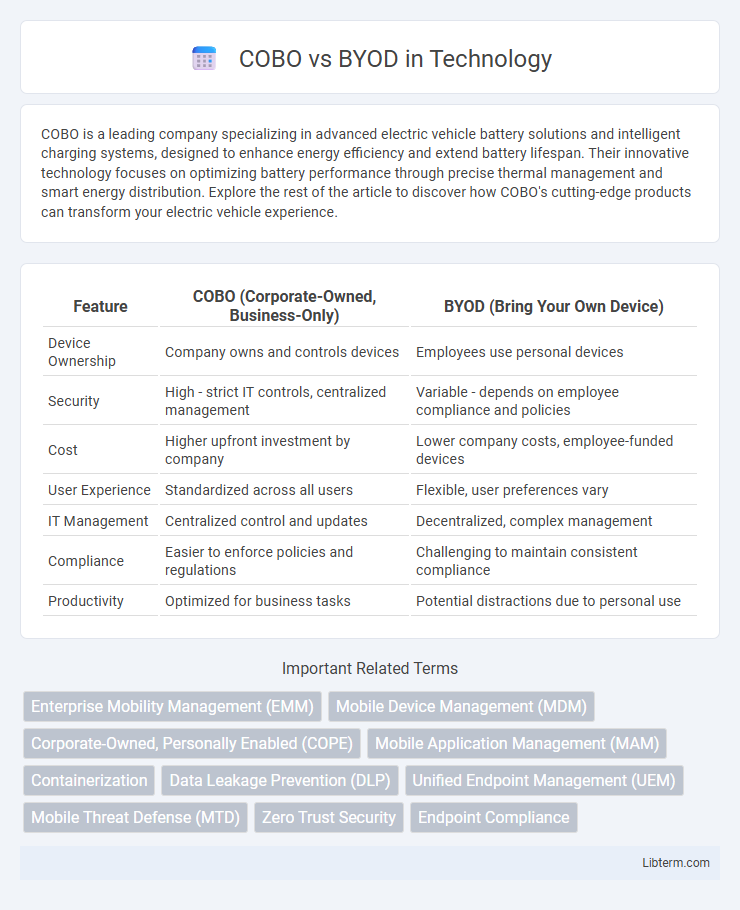COBO is a leading company specializing in advanced electric vehicle battery solutions and intelligent charging systems, designed to enhance energy efficiency and extend battery lifespan. Their innovative technology focuses on optimizing battery performance through precise thermal management and smart energy distribution. Explore the rest of the article to discover how COBO's cutting-edge products can transform your electric vehicle experience.
Table of Comparison
| Feature | COBO (Corporate-Owned, Business-Only) | BYOD (Bring Your Own Device) |
|---|---|---|
| Device Ownership | Company owns and controls devices | Employees use personal devices |
| Security | High - strict IT controls, centralized management | Variable - depends on employee compliance and policies |
| Cost | Higher upfront investment by company | Lower company costs, employee-funded devices |
| User Experience | Standardized across all users | Flexible, user preferences vary |
| IT Management | Centralized control and updates | Decentralized, complex management |
| Compliance | Easier to enforce policies and regulations | Challenging to maintain consistent compliance |
| Productivity | Optimized for business tasks | Potential distractions due to personal use |
Introduction to COBO and BYOD
COBO (Corporate Owned, Business Only) refers to a mobile device management approach where companies provide and strictly control devices for employee use, ensuring high security and compliance with corporate policies. BYOD (Bring Your Own Device) allows employees to use personal devices for work purposes, enhancing flexibility and user satisfaction while posing challenges in security and data management. The choice between COBO and BYOD impacts IT infrastructure, security protocols, and employee productivity strategies.
Defining COBO: Corporate-Owned Business Only
Corporate-Owned Business Only (COBO) refers to a device management model where organizations provide and control mobile devices exclusively for business use. COBO enhances security by restricting access to enterprise applications and data, preventing personal use and reducing the risk of data breaches. This approach contrasts with Bring Your Own Device (BYOD), where employees use personal devices for work, often posing challenges in maintaining consistent security and compliance standards.
Understanding BYOD: Bring Your Own Device
BYOD (Bring Your Own Device) allows employees to use personal smartphones, tablets, or laptops for work purposes, increasing flexibility and reducing company hardware costs. This approach raises security challenges, such as data breaches and unauthorized access, necessitating robust mobile device management (MDM) and endpoint security solutions. Organizations adopting BYOD must implement clear policies to safeguard corporate data while supporting employee productivity and device diversity.
Key Differences Between COBO and BYOD
COBO (Corporate Owned, Business Only) devices are company-issued smartphones or laptops strictly managed and used for business purposes, emphasizing control, security, and compliance. BYOD (Bring Your Own Device) allows employees to use personal devices for work, prioritizing flexibility and cost savings but often requiring robust security measures to protect corporate data. Key differences include ownership and management--COBO devices are owned and maintained by the organization with restricted access, while BYOD devices are personal, with varied security policies and increased risk of data leakage.
Security Implications: COBO vs BYOD
COBO (Corporate-Owned, Business-Only) devices offer enhanced security by allowing IT departments to enforce strict policies, control device configurations, and monitor usage, reducing risks of data breaches and unauthorized access. In contrast, BYOD (Bring Your Own Device) introduces security challenges such as increased vulnerability to malware, data leakage, and inconsistent compliance due to diversity in devices and user behavior. Enterprises implementing COBO benefit from centralized management and reduced attack surfaces, while BYOD requires robust Mobile Device Management (MDM) solutions and strong employee training to mitigate potential security threats.
Cost Considerations for Businesses
COBO (Corporate-Owned, Business-Only) devices typically have higher upfront costs due to bulk purchasing and centralized management but can reduce long-term expenses through enhanced security and standardized maintenance. BYOD (Bring Your Own Device) lowers initial hardware investments since employees use personal devices, but businesses may face increased costs from managing diverse platforms, security risks, and support challenges. Evaluating Total Cost of Ownership (TCO) reveals COBO often offers predictable budgeting, while BYOD requires investment in mobile device management (MDM) solutions and potential productivity losses due to compatibility issues.
Employee Productivity and User Experience
COBO (Company-Owned, Business-Only) devices provide enhanced security and standardized tools, which streamline workflows and reduce downtime, directly boosting employee productivity. BYOD (Bring Your Own Device) offers personalized user experiences, allowing employees to work with familiar technology, thereby increasing comfort and engagement. Balancing COBO's control with BYOD's flexibility is crucial for optimizing both productivity and user satisfaction in corporate environments.
Policy Management and Compliance
COBO (Corporate Owned, Business Only) ensures centralized policy management by allowing IT departments to enforce strict compliance protocols on devices exclusively used for work. BYOD (Bring Your Own Device) presents challenges for policy enforcement and compliance due to the diversity of personal devices and potential gaps in security controls. Effective policy management in BYOD environments relies heavily on Mobile Device Management (MDM) solutions to maintain compliance without compromising user privacy.
Selecting the Right Strategy: COBO or BYOD?
Selecting the right strategy between COBO (Corporate-Owned, Business-Only) and BYOD (Bring Your Own Device) depends on factors such as security requirements, employee flexibility, and IT management capabilities. COBO offers enhanced data protection and centralized control, ideal for organizations with stringent compliance needs, while BYOD boosts employee satisfaction and productivity by allowing the use of personal devices but may increase security risks. Evaluating the trade-offs between control and convenience helps determine the optimal approach tailored to organizational priorities and operational workflows.
Future Trends in Enterprise Device Management
Future trends in enterprise device management emphasize the integration of COBO (Corporate-Owned, Business-Only) and BYOD (Bring Your Own Device) models to balance security and flexibility. Advanced AI-driven security protocols and zero-trust architectures are being deployed to manage diverse device environments while protecting sensitive corporate data. Increased adoption of unified endpoint management (UEM) platforms enables seamless oversight of both COBO and BYOD devices, supporting scalability and compliance in evolving digital workplaces.
COBO Infographic

 libterm.com
libterm.com